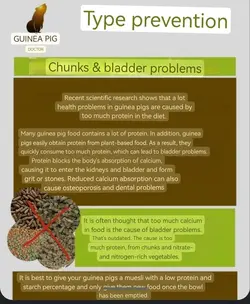Storm1974
Junior Guinea Pig
So I'm having a discussion on a US based Guinea Pig FB group, and we are discussing bladder stones and someone has posted about some research by a Dr Eva Stoffell about too much protein and nitrates in food (Mainly vegetables) can be a big contributor to the formation of stones!
I have attached an image below to help explain as I'm in a bit of a hurry right now, but they said that green leafy veg (Including lettuce) should be limited because it's high in nitrates.
And here are some of the comments I have copied:
"My vet didn’t think that there should be a problem with different lettuces, but I read before that green leafy veggies should be reduced.
Now reading the above study by Dr. Stoffell, it sounds like too much protein from nitrate and nitrogen-rich veggies may be one reason for stones.
I just googled “veggies high in nitrates” - and saw green, leafy vegetables are actually much richer in nitrates".
And somebody else added this:
"In the Netherlands there was a doctor (dr Eva Stoffels) that has don a lot of research about this subject. She found out that nitrate plays a verry important role in bladder stones. In Short,… Nitrate causes calcium to stick together as i understood. So low calcium dieet is Not the solution,.. Guinea piggs need calcium.
Try to avoid the nitrate and give veggies that contain enough water so he can pee it out. Ofcourse be careful if the poop gets thinner then give a Little less wattery veggies.
I also use an alternative chinese medicine called “chansa piedra”,.. works realy well".
And this:
"there is a dutch website with Information about it,.. maybe you can translate, it was also made with dr Eva Stoffels. Caviawijzer.nl is the sites name. It says for example Most green herbs like mint, basil, coriander etc.
Endive, spinach most lettuce. It is Not That you can Not give it but Not in big batches daily,.. and combine it with other veggies".
I think by 'chunks' they mean pellets. So, anyway, I'm wondering about cutting down on their green veggies, I do limit pellets but want them to get their Vit D because they're not outside at all, so don't want to cut them out completely. Even though I was told by somebody that the Versele Lago pellets I feed are terrible for giving pigs sludge!

I have attached an image below to help explain as I'm in a bit of a hurry right now, but they said that green leafy veg (Including lettuce) should be limited because it's high in nitrates.
And here are some of the comments I have copied:
"My vet didn’t think that there should be a problem with different lettuces, but I read before that green leafy veggies should be reduced.
Now reading the above study by Dr. Stoffell, it sounds like too much protein from nitrate and nitrogen-rich veggies may be one reason for stones.
I just googled “veggies high in nitrates” - and saw green, leafy vegetables are actually much richer in nitrates".
And somebody else added this:
"In the Netherlands there was a doctor (dr Eva Stoffels) that has don a lot of research about this subject. She found out that nitrate plays a verry important role in bladder stones. In Short,… Nitrate causes calcium to stick together as i understood. So low calcium dieet is Not the solution,.. Guinea piggs need calcium.
Try to avoid the nitrate and give veggies that contain enough water so he can pee it out. Ofcourse be careful if the poop gets thinner then give a Little less wattery veggies.
I also use an alternative chinese medicine called “chansa piedra”,.. works realy well".
And this:
"there is a dutch website with Information about it,.. maybe you can translate, it was also made with dr Eva Stoffels. Caviawijzer.nl is the sites name. It says for example Most green herbs like mint, basil, coriander etc.
Endive, spinach most lettuce. It is Not That you can Not give it but Not in big batches daily,.. and combine it with other veggies".
I think by 'chunks' they mean pellets. So, anyway, I'm wondering about cutting down on their green veggies, I do limit pellets but want them to get their Vit D because they're not outside at all, so don't want to cut them out completely. Even though I was told by somebody that the Versele Lago pellets I feed are terrible for giving pigs sludge!
